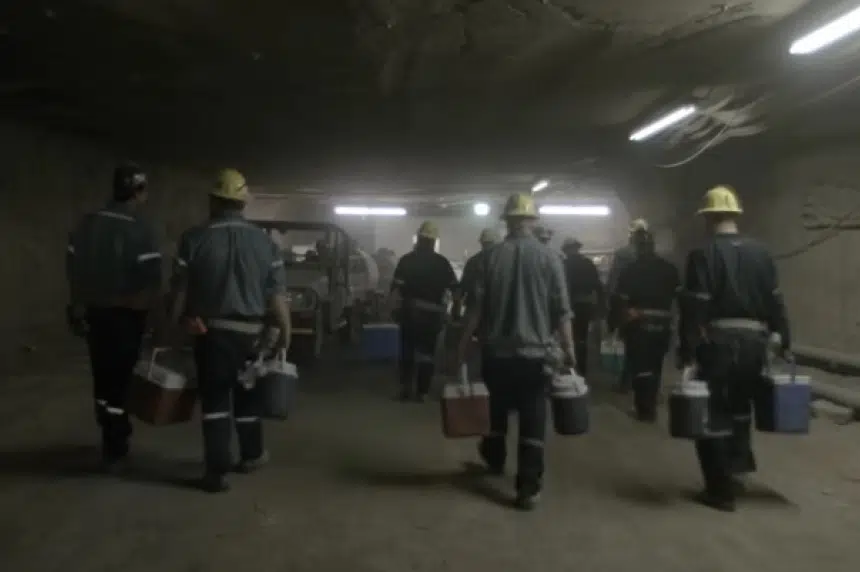As CN Rail and the Teamsters union announced a tentative deal to end an eight-day labour strike, potash company Nutrien said it still plans to proceed with a two-week shutdown of its Rocanville potash mine.
The shutdown is to start on Monday. About 550 employees are to be laid off during the shutdown.
The company first sent out notices on Monday.
“The altered shipping patterns resulted in the site reaching containment and will still require the two-week downtime to get inventories balanced,” Nutrien media relations person Will Tingley said in an emailed statement.
On Monday, Nutrien blamed the strike for the shutdown.
In a media release, president Chuck Magro said: “Any further disruption will be harmful to our business, the Canadian economy, and Canada’s competitive position and reputation as a reliable supplier of fertilizer and food. However, most concerning is the impact on our hundreds of employees for whom this creates great uncertainty and hardship leading up to the holiday season.”
On Tuesday, Tingley said: “The end of the strike is great news for farmers and the broader Canadian economy. It is also very good news for Nutrien as it will prevent further production slowdowns and shutdowns across our network.”
He said the company isn’t making anyone available for interviews.
Tingley said the strike created a backlog in Nutrien’s supply chain, which resulted in “lost export capacity that cannot be immediately recovered.”
Premier says producers still face challenges
Premier Scott Moe called the tentative agreement “absolutely a positive” for Saskatchewan’s export-driven economy and a “sigh of relief” for the entire country.
But he warned that the province’s producers will continue to face delays getting their goods to market by rail.
“We will have challenges in agriculture and the potash industry and our industries that are so reliant on moving this product out, as we are behind the 8-ball now,” Moe told reporters on Tuesday morning.
With a meeting scheduled with deputy Prime Minister Chrystia Freeland later in the day, Moe said he would be asking the federal government to help clear the backlog producers face through the company’s winter transportation plan.
“The federal (transport) minister does approve that program and he most certainly has a role to play in ensuring that we have the capacity to move our products in this province out into the winter,” he said.
“I’m asking him to look at the plans that will be submitted to him very seriously, that maybe we are able to continue with some of our summer transport capacity much longer into the winter or into the winter.”
The premier said he learned the news right after speaking at a breakfast panel on food, fuel and free trade at Agribition, an event that reporters pointed out was sponsored by CN.
Moe rejected suggestions that his presence could be seen as him taking sides in the dispute, saying he didn’t think the tentative agreement had anything to do with his appearance on stage.
On Nov. 19, about 3,200 CN conductors, train operators and yard workers started striking, flagging long hours, fatigue and safety as their chief concerns.
A letter addressed to federal Labour Minister Patty Hajdu and Transport Minister Marc Garneau from three provincial ministers signed Nov. 18, called on the federal government to “act as expediently as possible to end this potential labour disruption from occurring.”
As workers at CN Rail go on strike, our govt is greatly concerned about the impact a work stoppage will have on producers that are already facing a tough harvest.
There needs to be an agreement reached immediately to ensure there is no delay in getting our commodities to market. pic.twitter.com/k2MmRxe9DA
— Scott Moe (@PremierScottMoe) November 19, 2019
“In the event of a strike action, Saskatchewan asks that the Federal Government take immediate action to end the dispute so our industries will not be adversely affected by work stoppages,” the letter read.
Moe pointed out that the parties came to a negotiated agreement.
“This is what we have asked for all along. It’s the quickest, it’s the swiftest and we always said, the best agreements do come at the bargaining table and we’re thankful to both sides for this tentative agreement today,” he said.
Ag minister happy to see strike end
It was just moments before Saskatchewan Agriculture Minister David Marit went on the air with John Gormley on Tuesday that the news broke of the tentative deal between the railway and the union.
“It’s good news to hear that the trains will start rolling again here very soon,” Marit told Gormley.
Marit met with his federal counterpart, Marie-Claude Bibeau, on Monday and said he urged her and her government to step in and put a stop to the strike.
The provincial government had been urging the federal Liberals to step in since last week, even floating that back-to-work legislation might be necessary.
“We tried everything in our means to get them back to the tables and we talked to, obviously, all parties that we could talk to and we were hopeful that they would have got back to the table last weekend and come to an agreement,” said Marit.
According to Marit, those industries that depend on the rails – including potash, oil and agriculture – were put quite behind, in some cases, by the strike.
“I did talk to industry leaders (Monday) and they said a week-long strike pushes everything back two to three weeks, so we sure didn’t need to see this go on much longer,” Marit said.
Marit said he’d been told by industry representatives that the strike was costing them a lot – “I can you it was significant. It was huge,” he said – but he declined to go into detail.
The trains are expected to start moving again Wednesday morning.
— With files from 980 CJME’s Joseph Ho







